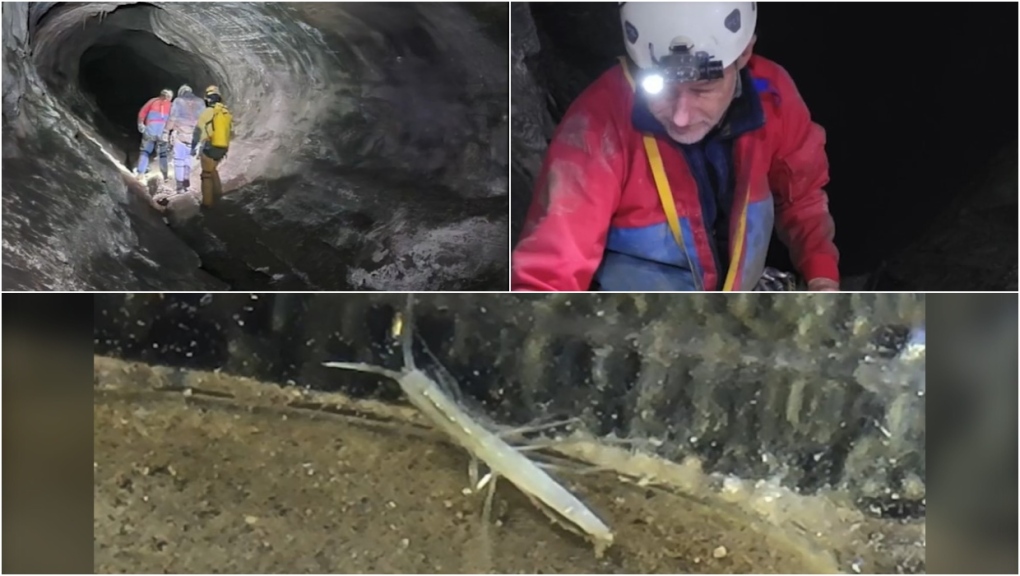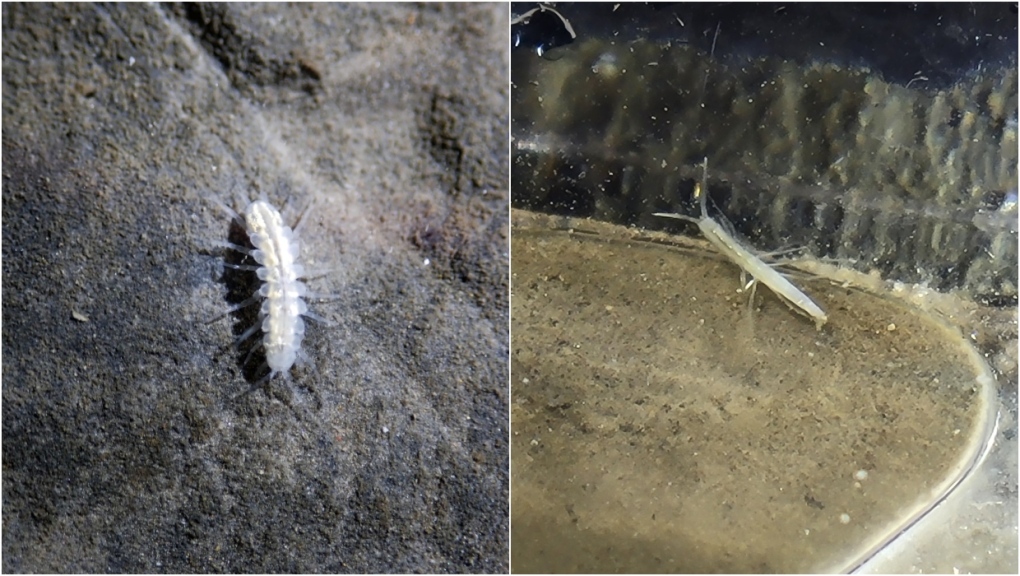Banff National Park cave creature exists 'no where else': Parks Canada
 A cave in Banff National Park has been recognized as a globally significant Key Biodiversity Area (KBA) thanks to the freshwater amphipod crustacean found inside. (KBA program)
A cave in Banff National Park has been recognized as a globally significant Key Biodiversity Area (KBA) thanks to the freshwater amphipod crustacean found inside. (KBA program)
A cave in Banff National Park has been recognized as a globally significant location thanks to a tiny creature found inside.
The freshwater amphipod crustacean, known as the Castleguard Cave amphipod (Stygobromus canadensis), is largely transparent and looks like a miniscule shrimp, but it's hugely important.
"This tiny cave-dwelling organism is only found in Castleguard Cave, and no where else on the planet," said Anne Forshner, Parks Canada species of concern ecologist.
It's because of the amphipod that Castleguard Cave has recognized as a Key Biodiversity Area (KBA).
"Scientists still don’t know a great deal about this particular amphipod, which has somehow survived for millennia in this cold, nutrient poor and frequently flooded environment, but its uniqueness made this site a prime candidate for KBA status," said Parks Canada in a news release.
 A cave in Banff National Park has been recognized as a globally significant Key Biodiversity Area (KBA) thanks to the freshwater amphipod crustacean found inside. (Wildlife Conservation Society Canada)Located in the north end of Banff National Park, Castleguard Cave is a limestone cave that features one Canada's longest known cave systems – 21 kilometres in length.
A cave in Banff National Park has been recognized as a globally significant Key Biodiversity Area (KBA) thanks to the freshwater amphipod crustacean found inside. (Wildlife Conservation Society Canada)Located in the north end of Banff National Park, Castleguard Cave is a limestone cave that features one Canada's longest known cave systems – 21 kilometres in length.
"Castleguard Cave itself is a unique environment," said Forshner. "Part of the cave exists underneath the glaciers that form the Columbia Icefields, and while there is much research into glaciers, cave ecology in this part of North America is poorly understood."
The cave is located about 170 kilometres north of the Cave and Basin Historic Site.
Castleguard Cave joins two other sites in Alberta recognized by the KBA program – the Frank Lake wetland near High River, Alta. and the Peace-Athabasca Delta in northeast Alberta.
The KBA program works with governments, local conservation organizations, scientists and Indigenous Nations to collaboratively identify the places that are most critical to conserve to avoid losing a species or ecosystem.
Sites are recognized based on meeting strict criteria.
While KBAs are not designed to provide any legal protection, they are a way of identifying places in unprotected areas where conservation and stewardship efforts can have a large impact on halting and reversing the loss of nature.
More than 70 sites across Canada are listed as KBAs and more than 850 more under consideration.
To learn more you can visit the KBA Canada website.
CTVNews.ca Top Stories

BREAKING Celine Dion stages comeback with performance at Paris Olympics opening ceremony
Celine Dion staged the comeback of her career during the opening ceremony at the Olympic Games in Paris.
Jasper wildfire: 'Several weeks' before Jasper can return, premier says
Premier Danielle Smith said Friday afternoon in Hinton while weather conditions are cooler, the Jasper fire is still considered out of control and that Jasper residents can expect to be away from their homes "for several weeks."
Driver charged after flashing high beams at approaching police
Orillia OPP arrested and charged a driver with impaired driving after flashing their high beams.
'He was just gone': Police ramp up search for vulnerable 3-year-old boy in Mississauga, Ont.
Police in Mississauga are conducting a full-scale search of the city’s biggest park for a non-verbal toddler who went missing Thursday evening. Sgt. Jennifer Trimble told reporters Friday morning that there has been no trace of three-year-old Zaid Abdullah since 6:20 p.m., when he was last seen with his parents in Erindale Park, near Dundas Street West and Mississauga Road.
Irish museum pulls Sinead O'Connor waxwork after just one day due to backlash
An Irish museum will withdraw a waxwork of singer-songwriter Sinéad O’Connor just one day after installing it, following a backlash from her family and the public, it told CNN in a statement on Friday.
Turpel-Lafond won't sue CBC over Cree heritage report that took 'heavy toll': lawyer
The lawyer for a former judge whose claims to be Cree were questioned in a CBC investigation says his client is not considering legal action against the broadcaster after the Law Society of British Columbia this week backed her claims of Indigenous heritage.
Health Canada warns some naloxone kits contain false instructions
Health Canada is warning some take-home naloxone kits come with bad instructions that should be ignored in favour of the correct guidance.
Winnipeg senior's account overdrawn $146,000 for water bill
A Winnipeg senior is getting soaked with a six figure water bill.
Paris Olympics kicks off with ambitious but rainy opening ceremony on the Seine River
Celebrating its reputation as a cradle of revolution, Paris kicked off its first Summer Olympics in a century on Friday with a rain-soaked, rule-breaking opening ceremony studded with stars and fantasy along the Seine River.
































